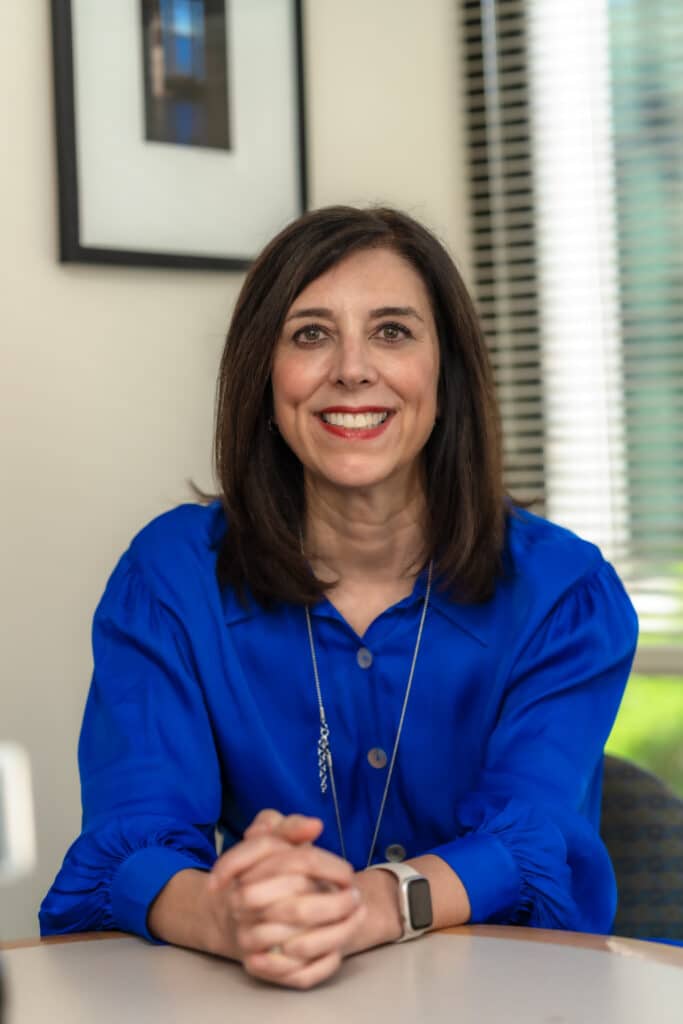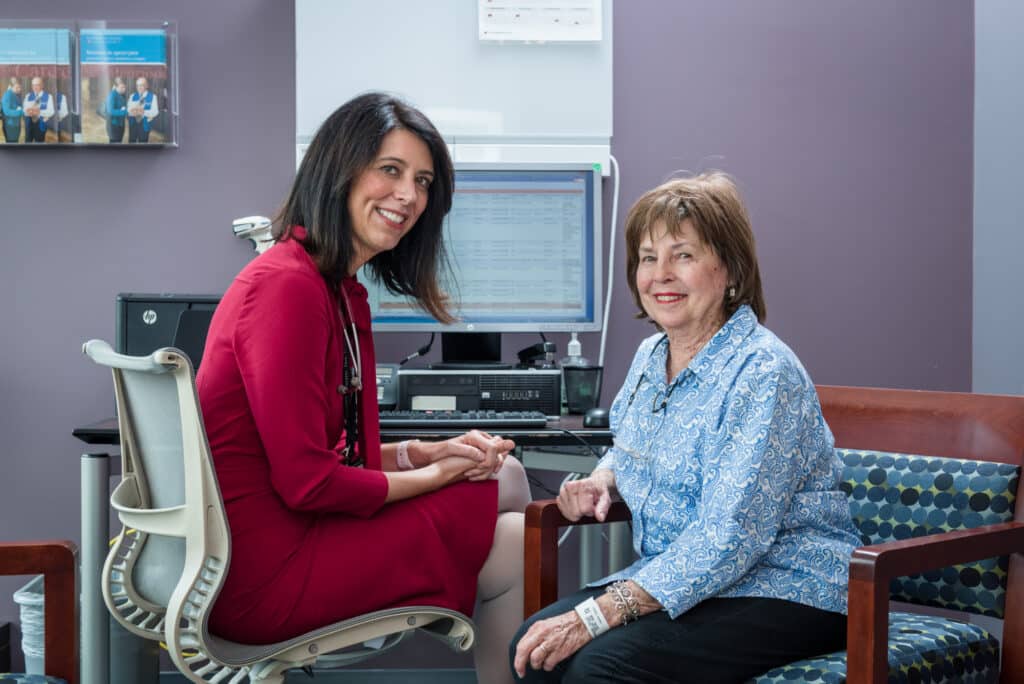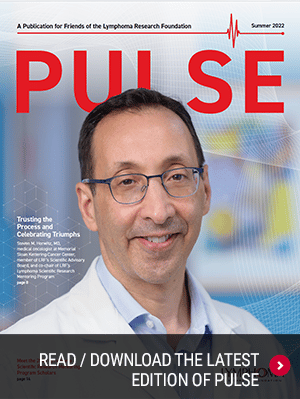A Dedication for Caring for Others

Ann S. LaCasce, MD, MMSc, an Associate Professor of Medicine at the Dana-Farber Cancer Institute, grew up in a healthcare-centered family. Her father was an internist in a small community in Maine, and as a teenager, Dr. LaCasce would work in his office when not in school. Her mother worked as a nurse and later became a high school science teacher. With a front-row seat to her parents’ passion for science and caring for others, it’s not surprising Dr. LaCasce is where she is today: a respected researcher and clinician advocating for the advancements that give the lymphoma community new treatments and hope.
Dr. LaCasce majored in biochemistry at Bowdoin College but didn’t immediately gravitate toward healthcare. With an underlying affection for art history, she moved to New York City after graduation to manage a contemporary art gallery. She enjoyed the experience but quickly realized that she wanted to do something where she could care for others – as she’d seen her parents do her whole life. After setting off for medical school at Tufts University, she took a first-year hematology course directed by Dr. Jane Desforges, a world-leading hematologist who was recognized with Tufts University School of Medicine’s Outstanding Teacher Award for 13 consecutive years. Dr. LaCasce was enthralled by Dr. Desforges and had instantaneous respect for her as a female trailblazer
in medicine.
“Dr. Desforges was an early female member in the American Society of Hematology (ASH) and a former president. I wanted to be just like her. I just knew this is what I wanted to do,” says Dr. LaCasce.
Dr. LaCasce soon found herself drawn to lymphoma and recalls being particularly interested in the pathology of lymphoma early on in her medical school studies. She thoroughly enjoyed her hematopathology (the study of diseases of the cells that make up our blood) rotation, but still found herself yearning for the opportunity to care for
others firsthand.
She completed her training in internal medicine at Brigham and Women’s Hospital in Boston, where she later served as a Chief Medical Resident. She completed her fellowship in hematology at Dana-Farber/Mass General Brigham, where she homed in on lymphoma and ultimately landed her “dream job” as a lymphoma physician, clinical researcher, and later as the Director of the Dana-Farber/Mass General Brigham Fellowship in Hematology/Oncology.
“Lymphoma is so varied and there’s so much to do to move research forward. Seeing patients over time is like seeing old friends,” says Dr. LaCasce. “My job is a privilege – I just can’t describe it any other way.”
Meaningfully Mentoring the Next Generation of Scientists

Dr. LaCasce’s multifaceted role also includes supporting and ushering in the next generation of hematologists and oncologists at Dana-Farber. As a chief resident, she thoroughly enjoyed working with trainees, and now she gets to work with fellows every day.
“As you progress in your career, you recognize it’s not about what you accomplished in terms of publications and talks,” says Dr. LaCasce. “It’s about promoting the next generation and making sure they have opportunities, making sure they feel they have something to contribute, and making sure they’re recognized – because they’re our future.”
Dr. LaCasce recalls not fully grasping the importance of mentorship when she was in training, and along with LRF’s engagement in mentorship, she feels her appreciation of it has evolved dramatically. She wants trainees to engage in mentorship deliberately and to find mentors who are as excited to work with them as they are for the opportunity to work with their mentor.
“There’s nothing like it, watching these pairings and watching people’s careers take off. It’s really fun,” says Dr. LaCasce. “Lymphoma investigators are an incredibly tight-knit community of amazing people. You can be part of this community that works together and collaborates. And you can have the opportunity to structure a fulfilling career in so many different ways.”
As a female leader in her field, Dr. LaCasce feels fortunate to have worked alongside other remarkable women and wants even more women to join her in the field. Whether through mentoring or representation in leadership roles, women are a huge part of the workforce, with endless talent and potential.
“I’ve met the most incredible women around the world who are doing remarkably inspiring work. There are a lot of ways to have a career in medicine, so we need to support and guide these women to stay in academics and in the lymphoma field specifically,” Dr. LaCasce says.
A Commitment to Research Is a Commitment to a Cure
Dr. LaCasce’s day-to-day is varied, from treating patients to performing clinical research and running the fellowship program. When she’s not at the clinic, she’s catching up on research projects, writing, and editing. Seeing all facets in the continuum of care, she feels each element makes the other stronger.
“I think it makes you a better clinician to be involved in research studies. When you’re treating a patient on a clinical trial, you work with a team and you’re following the patient very closely – you’re always thinking about the patient sitting in front of you, trying to come up with a plan. And when you’re a clinical researcher, you really think about what’s best for the patient. Both will hopefully improve outcomes for patients,” says Dr. LaCasce.
In the past 20 years that Dr. LaCasce has been a clinician, she’s seen firsthand how research has led to improved outcomes. Going from using standard chemotherapy in every situation to having multiple different treatment options today, she says it’s “unbelievable” to watch the improvement in treatments for chronic lymphocytic leukemia (CLL) in particular.
“Looking at cellular therapies, our scientists helped drive the new therapies and give them to patients. Previously, patients who had aggressive lymphomas that recurred quickly after chemotherapy, had very limited options. And now that’s completely changed,” says Dr. LaCasce. “We have bispecific antibodies that are going to be applicable across multiple different lymphomas. It’s mind boggling how much the field has changed, particularly within the past 10 years.”
When asked about what new treatments she’s most excited about, Dr. LaCasce is excited about them all – immunotherapy, targeted agents, new treatment combinations, chimeric antigen receptor (CAR) T-cell therapy, etc. She has never experienced anything quite like the huge difference being made in people’s lives because of the research and clinical trials being conducted. She’s seen patients’ white blood cell counts go from 300,000 to a
normal count of less than 10,000 in a day. Other patients are now able to take oral drugs instead of undergoing standard chemotherapy.

“We’ve watched people’s CLL melt in front of our eyes. They’re living their lives, and it’s really had such an enormous impact on patients. It’s just incredible,” says Dr. LaCasce.
Dr. LaCasce is dedicated to finding a cure for lymphoma and is quick to point out that LRF is a big part of that commitment.
“I think it’s our responsibility as hematologists and oncologists to present clinical trials to patients and to discuss these options, but some of our patients may not live in areas with easy access to care. LRF has such great resources for patients to learn about their diseases, by phone or through online materials. Patients and their families can attend patient symposiums, they can ask about clinical trials, they can contribute their information or patient samples to a database trial – all because of LRF,” Dr. LaCasce says.
Dr. LaCasce points out that many CLL patients gave their blood to research projects that allow scientists to have access to tumor cells, which are in the blood. Patients who contributed their blood and materials have helped move the field forward, directly leading to the development of new therapies.
“Clinical trials aren’t right for everybody,” Dr. LaCasce is quick to point out. “Sometimes the burden is too much, or the commute is too far, or you may not be able to tolerate the trial. It’s a matter of asking, getting the information, and working together with your provider to understand what the options are and if it works for you. But it’s always worth asking because we’re now starting clinical trials that are specifically geared toward elderly patients, for example, who may not tolerate full-dose therapy, and these are very, very important trials for us to better understand how to treat this growing population of vulnerable patients.”
With a promising pipeline of researchers and clinicians and groundbreaking research and trials, the field of lymphoma has had a lot of positive outcomes that other cancers haven’t yet experienced, but there’s still a lot of work to do. Lymphoma diseases affect people at every stage of life, and while many patients live for many years with lymphoma as lymphoma survivors, there is a lifelong commitment to ensuring patients can continue to have productive, healthy lives.
“LRF impacts the future of clinical, basic, and translational lymphoma research in so many different ways, from the scientific mentoring program to supporting lab scientists and clinical researchers through regular grants,” she says. “All of the things that LRF does to support lymphoma will lead to more breakthroughs and cures.”
Read More Articles from Pulse
Pulse is a publication of the Lymphoma Research Foundation, providing the latest updates on the Foundation and its focus on lymphoma and chronic lymphocytic leukemia (CLL) research, awareness, and education



